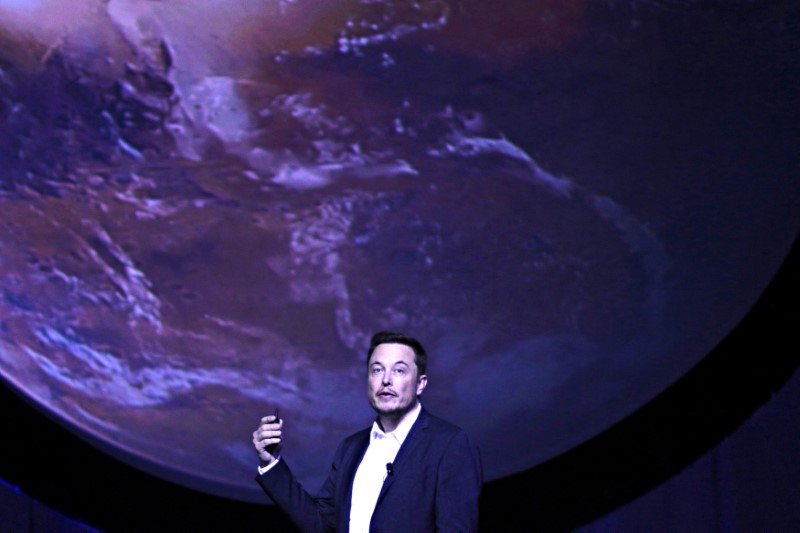(The opinions expressed here are those of the author, a columnist for Reuters.)
By Clyde Russell
LAUNCESTON, Australia, March 14 (Reuters) - Australia is becoming an interesting microcosm on how to, or how not to, transition an economy from being predominantly powered by coal to more climate-friendly alternatives.
The dramatic intervention by Tesla Inc TSLA.O Chief Executive Elon Musk last week is just the latest twist in an ongoing saga that pits business, government, farmers, government and environmentalists against each other.
Musk, in an exchange of tweets with software billionaire Mike Cannon-Brookes, chief executive of Atlassian Corp, offered to fix the electricity supply problems of South Australia state within 100 days of signing a contract.
Musk's plan is to install 100 megawatts (MW) of grid-connected battery storage, which would be available to meet peak demand and would be charged with surplus electricity from other generating sources in periods of low demand.
It's a bold offer and would most likely provide a quick fix to Australia's fourth-largest state, which suffered a blackout last November and has been dealing with power shortages over the peak summer period.
Businesses like BHP Billiton (LON:BLT) BHP.AX , which operates the giant Olympic Dam copper mine in the state, have been pushing for the government and other stakeholders to ensure stable electricity supply, saying the cost of blackouts runs into millions of dollars in lost output.
Musk, whose Tesla Corp is ramping up output of its battery storage packs at its Gigafactory in Nevada, held talks with Australian Prime Minister Malcolm Turnbull at the weekend, as well as with South Australian Premier Jay Weatherill.
The politicians will no doubt be tempted to Musk's offer to install batteries, especially since the electric car pioneer said if he didn't meet his 100 day deadline, he wouldn't charge anything.
But while Musk's offer, if taken up, would provide a quick fix, it would not do enough to mend the underlying problems at the heart of Australia's electricity woes.
It's worth looking at how Australia got itself to the point where virtually all players can agree that the nation is facing something approaching an energy crisis.
After all, the country is not short of fossil fuels such as coal and natural gas, and its climate and low population density outside the major cities are ideal for renewables such as solar and wind power.
The country is heavily reliant on an ageing fleet of coal-fired power stations, which makes Australia one of the highest polluters per capita.
These coal power stations are starting to close down, with one shutting in South Australia last year and another planned to close in Victoria state at the end of this month.
The problem is that the coal-fired power stations' role as providers of base load electricity cannot be taken over by wind and solar, and the role is falling to natural gas.
But natural gas is also the most expensive method of generating electricity in Australia, so utilities are reluctant to run their gas-fired plants until prices are high enough to justify the cost.
South Australia has a gas-fired plant that was mothballed until last year's power supply crisis, but even with the higher prices for electricity, the operator is struggling to make the plant profitable.
The state moved on Tuesday to try and address its energy security issues, announcing it would build a 250 MW gas-fired plant and help the private sector build a 100 MW battery, at a total cost of A$510 million ($385 million). SUPPLY CONSTRAINTS
Natural gas supply is becoming a problem in Australia, which may seem ironic given the country is on the verge of becoming the world's largest exporter of liquefied natural gas (LNG) as the last of eight new plants come closer to completion.
In fact, the new LNG plants are copping some of the blame for the tightening natural gas market, especially the three in eastern Queensland state based on using coal-seam gas as the feedstock.
These are being blamed for sucking domestic natural gas out of the market and into the export LNG industry.
What hasn't helped is that some of Australia's state and territory governments are also pursuing policies that will restrict future natural gas supplies.
Victoria state has banned hydraulic fracturing, or fracking, as well as shale and coal-seam gas exploration, while the Northern Territory, New South Wales and Tasmania have various moratoriums on fracking.
This leaves Western Australia, Queensland and South Australia as the remaining states where onshore natural gas supplies can be developed, and they are now in the cross-hairs of the environmental lobby, which is opposed to any and all new natural gas wells.
Politicians across the traditional Labor-Liberal divide are increasingly giving in to demands to restrict natural gas exploration, while pretending that this won't have a negative impact on energy security and electricity prices.
But the costs are starting to become apparent, with spot electricity prices surging over the Australian summer and natural gas suppliers warning that they will be unable to meet the needs of industrial customers without action being taken.
It's often the case politicians only take action when the point of crisis is reached, and this appears to be the case in Australia.
What's needed is a holistic approach to energy supply as Australia transitions away from coal-fired power.
This means ensuring enough natural gas is available to provide base load generation, while scaling up renewables such as solar, wind, pumped hydro and battery storage.
Forging enough common ground with the various stakeholders will be the main obstacle, but more than anything else, Australia is showing how difficult it is to end the age of coal.
(Editing by Richard Pullin)
